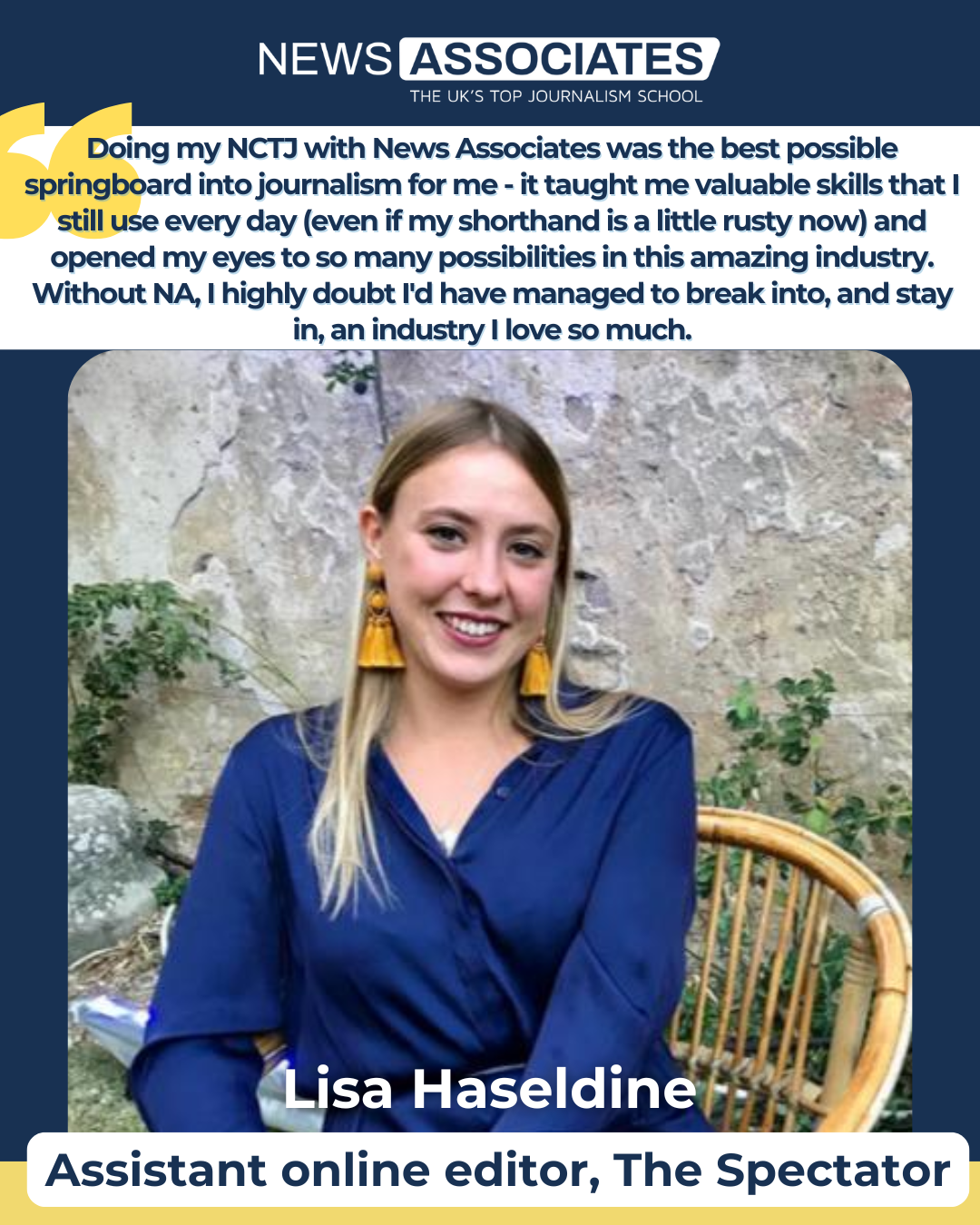Want to study with us at News Associates? Here are some of the questions we get asked regularly about our in-person 40-week part-time journalism courses.
What is the NCTJ?
The National Council for the Training of Journalists administers the industry’s qualification for aspiring reporters in the UK. Most journalism jobs require the NCTJ qualification. It is a charity which provides a world-class education and training system for aspiring journalists, meeting the demands of a fast-changing multimedia industry.
NCTJ accreditation is widely viewed in the industry as the benchmark of excellence for journalists.
Read about what the NCTJ is and why it is important here.
Are the modules the same across the courses?
We deliver a variety of NCTJ modules across all of our courses. Our courses are all slightly different so we hope there’s a course out there for you.
You can still achieve the highly sought-after gold-standard NCTJ Diploma on all of our courses
Read about the modules here: https://newsassociates.co.uk/nctj-course-elements/
If I sit and pass shorthand, are the other modules still compulsory?
Yes, shorthand and court reporting are the only optional modules and they are in addition to the other modules.

How does my work placement work on the part-time course?
Building up an impressive portfolio of work is vital while you’re studying with us, and we try to be as flexible as possible in how you undertake your work experience.
Many part-time trainees choose to take holiday from their full-time jobs to undertake a block of work placement for a week or two. Or, if it suits your lifestyle better, you can go on placement one day a week like our full-time trainees.
There’s also the option to contribute to our sister publications The Londoners. You will write for these publications loads as part of your course anyway. You can pitch to us whenever you like and join our Wednesday placement days too.
There will also be plenty of opportunities to cover breaking news and get stuck in with reporting. Just recently our trainees have covered the death and funeral of Queen Elizabeth II and King Charles III’s coronation and the general election.
Can you help me find a placement?
We encourage all of our trainees to reach out to as many publications as they can to get a placement in the first instance – you may have your own contacts and you know what you are interested in. If needed, we can help by sharing contacts and looking over CVs and cover letters etc.
Brilliant work on placement at our sister sports agency @James_Taylor_02 ⚽️✨ #TeamNA #StartedHere https://t.co/qsJwrwi9CE
— News Associates (@NewsAssociates) January 28, 2025
Will you help me find a job?
We’re passionate about the fact our job isn’t over until we’ve found you one. We have an unrivalled network of alumni contacts who frequently send us jobs to circulate to trainees.
The course involves sessions on employability, such as CV clinics and mock interview practice, as well as guest speakers and networking events.
Are remote lessons recorded?
No, Wednesday evening classes and optional shorthand lessons on Monday nights are taught live with a tutor, nothing is pre-recorded or recorded.
Tutors will use teaching techniques developed during the lockdown of 2020 – when all courses were delivered via Zoom – which led to News Associates winning the Innovation of the Year 2020 award at the NCTJ’s Awards for Excellence.
See more here: https://newsassociates.co.uk/innovation-of-the-year-news-associates-nctj-awards-for-excellence/
What about finding a job – am I at a disadvantage studying part-time?
Not at all. We frequently speak to employers who say they’re always impressed when a candidate has completed their NCTJ diploma part-time – it illustrates hard word and commitment.
All of our trainees have access to a jobs board where we frequently post job listings sent to us from employers and industry connections.

Will there be lots of homework?
On all of our courses, you won’t pass just through attending lessons – you will need to do some revision and coursework in your own time.
You’ll also be working on your portfolio – but that shouldn’t feel like homework! For most subjects, the vast majority of work will be completed in lessons, unless you’re revising ahead of an exam.
What are your entry requirements? Do I need a degree?
The majority of our trainees have an undergraduate degree, from a variety of different subjects, however we are looking for a clear passion and commitment to the industry, such as through student media or relevant work experience.
We sometimes accept applications from mature applicants without formal qualifications. It is highly desirable that you have some relevant work experience in journalism, this may be paid work, an internship, student journalism at your university/college, freelance work, or a combination of these.
If English is not your first language, you must get a minimum overall score of 7.0 in the IELTS English language test, including at least 7.0 in the writing component of the test. You will be required to take this test at your own expense.
How does the application process work?
Our application process has three phases. The first stage is this short form online.
After your initial online application is assessed by our training team you will be emailed a longer admissions form which you will need to fill out and email back.
If successful, the final stage is an interview and exam at our office or remotely.
Subject to passing the exam and impressing in the interview you will be offered a place to study with us.
We regret that due to the high number of applications we are not able to give individual feedback on the process.

Can I apply if I’m based internationally?
International trainees can apply for all our training schemes but please note we are not on the Sponsor Register of Employers and are not currently in a position to sponsor Tier 2 or Tier 4 visas for international graduates. Therefore our courses are not eligible for student visas and we cannot assist with any visa applications.
Alternatively, you could apply for our 18-month remote-only course. This allows our trainees to study from anywhere!
How much does the course cost?
Click here to read about fees and funding: https://newsassociates.co.uk/fees-funding/
Can I talk to someone or come and have a look round before I make my decision?
Many of our trainees came to one of our free workshops first to meet the team, but we’re also more than happy to book a time for you to come and ask us your questions. Please email us at training@newsassociates.co.uk or call us on 0203 026 3781.
Got a question about our journalism courses? Contact us on training@newsassociates.co.uk or 0203 026 3781.
Sign up for a free journalism workshop here.
Apply for our NCTJ-accredited journalism courses here.
Got a question about our part-time journalism courses? Contact us on training@newsassociates.co.uk or 0203 026 3781.
For advice from former News Associates part-time trainees click here.
Sign up for a free journalism workshop here.
Apply for our part-time journalism course here.


